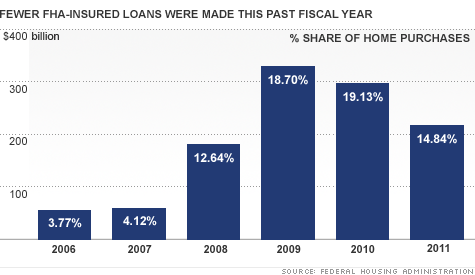Search News

NEW YORK (CNNMoney) -- Continued trouble in the housing market has further eroded the Federal Housing Administration's reserves, leaving it with a very thin cushion to protect it against future financial losses.
And should housing values continue to plummet, the agency may have to turn to taxpayers for a bailout, according to its annual report, which was released Tuesday.
The agency's reserves fell to 0.24% in fiscal 2011, down from 0.5% the year earlier, according to independent estimates in the report. This ratio measures the net worth of the reserve fund compared with the value of the loans FHA has insured.
If home prices continue to drop in the coming year, the agency's losses could exceed its reserves, forcing it to either seek a bailout from the Treasury Department or once again increase the premiums it charges borrowers.
Agency officials, however, downplayed the risk of it needing a government bailout. They pointed to forecasts from Moody's Analytics, which call for home prices to rise 1.2% in fiscal 2012 under its baseline scenario.
"It would take a very significant decline in home prices for the portfolio to require any additional support," said Carol Galante, FHA's acting commissioner.
The report also said that while there is a close to 50% chance that the losses on the agency's current portfolio could exceed its current cushion, it said the reserve fund will be bolstered by the new loans FHA insures in the coming year.
In fact, reserves are expected to return to 2% under the actuaries' baseline scenario, which calls for home prices to rise over the next three years. That would put it within the threshold mandated by Congress.
Outside experts, however, say they continue to worry about the agency's fiscal soundness, especially since it has insured hundreds of billions of new loans in the past three years. Most of these carried very small down payments.
"To most observers in the mortgage industry that means a considerable amount of risk, particularly if housing prices continue to fall," said Guy Cecala, publisher of Inside Mortgage Finance, an industry publication.
The agency may also be underestimating how far underwater many of its borrowers are, as well as other risks, said Joseph Gyourko, a real estate professor at the University of Pennsylvania's Wharton School. He estimates the agency could face losses of between $50 and $100 billion in coming years and will require funding from the federal government.
The FHA had skyrocketed in popularity during the housing meltdown since it backstops banks if borrowers stop paying and requires buyers to put down only 3.5% -- although they also pay higher insurance premiums.
But FHA also saw its delinquencies balloon, forcing it to raise its premiums and increase its average credit score, which topped 700 for the first time in fiscal 2011. Most of the agency's problems stem from the loans it insured prior to the middle of 2009. These independent experts expect losses from these older loans to eventually total more than $26 billion.
The agency's annual report comes as Congress debates whether to once again increase the limit on loans FHA insures. That level fell to $625,000 after being hiked to as much as $729,500 during the housing crisis.
At the same time, fewer buyers are turning to FHA-insured loans, the report found.
The agency insured 15% of home purchases in fiscal 2011, down from 19% in fiscal 2010 and 2009, according to the agency's annual report to Congress, released Tuesday. The cause for the drop-off was twofold: fewer people were buying homes and the agency raised its insurance premiums, making it a less attractive option.
The FHA doesn't mind that it is becoming less popular since it signals the revival of the private mortgage market, Galante said.
| Overnight Avg Rate | Latest | Change | Last Week |
|---|---|---|---|
| 30 yr fixed | 3.80% | 3.88% | |
| 15 yr fixed | 3.20% | 3.23% | |
| 5/1 ARM | 3.84% | 3.88% | |
| 30 yr refi | 3.82% | 3.93% | |
| 15 yr refi | 3.20% | 3.23% |
Today's featured rates:
| Latest Report | Next Update |
|---|---|
| Home prices | Aug 28 |
| Consumer confidence | Aug 28 |
| GDP | Aug 29 |
| Manufacturing (ISM) | Sept 4 |
| Jobs | Sept 7 |
| Inflation (CPI) | Sept 14 |
| Retail sales | Sept 14 |